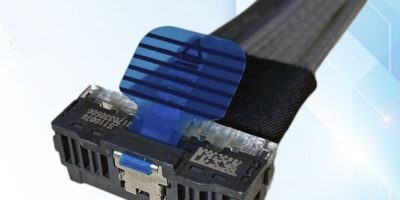NearStack PCIe improves connection to Open Compute project servers, says Molex
Direct-attached cable technology is used to improve signal integrity, lower insertion loss and reduce signal latency in Molex’s PCIe cable connection system for Open Compute project servers.
NearStack PCIe connector system and cable assemblies was developed in collaboration with members of the Open Compute Project to replace traditional paddle-card cable in an effort to optimise signal integrity and improve system performance.
The twinax termination eliminates the need for paddle cards within the cable assembly. Unlike competing cable jumpers, which are terminated by hand-soldering cables onto a PCB paddle card, NearStack uses a fully automated wire termination process. This high-precision process improves manufacturing efficiencies, repeatability and signal integrity, claimed Molex.
The NearStack PCIe is “ideal for next generation PCIe Gen 5 and Gen 6 system implementation,” said Bill Wilson, new product development manager, Molex Enterprise Solutions. “[It] is capable of 32Gbits per second NRZ data rates, enabling server OEMs to achieve unprecedented performance,” he said.
Molex has optimised the cable assemblies for efficient use of space as well as safe and easy attachment. Smart, rugged mechanical features, along with the optional “angle-exit” cable design, let engineers plug the jumpers into crowded boards to alleviating space constraints. NearStack PCIe also offers a low mated profile for improved airflow management and minimises interference with neighbouring components.
NearStack PCIe supports hybrid cables, with a NearStack PCIe connector on one end and legacy connector on the other, to facilitate integration.
The Open Compute Project is a consortium of industry leaders dedicated to combining the best available technologies into standardized hardware development with high-speed and high-bandwidth capabilities.
NearStack PCIe was defined and adopted as a standard by the Open Compute Project’s Small Form Factor (SFF) committee as SFF-TA-1026. The Open Compute Project (OCP) recommends the technology (TA-1026) for server reference designs.
NearStack PCIe also has been included in the OCP Modular – Extensible I/O (M-XIO) specification and the Modular – Full Width HPM Form Factor (M-FLW) as part of the next generation OCP Data Centre – Modular Hardware Systems (DC-MHS) family. As part of an open SFF standard, the technology is available to second-source vendors under license.
Molex will be exhibiting the NearStack PCIe at OCP 2022 (18 to 20 October) in San Jose, California, USA, Booth B1.




